7153AFE Ethics and Governance: Ethical Issues in Hospital Finance
VerifiedAdded on 2023/06/07
|7
|2098
|383
Case Study
AI Summary
This case study delves into the ethical and governance challenges faced by a hospital trust, specifically focusing on the role of the deputy director of finance and information. The director's pressure to maintain an 'excellent' rating leads to potential misreporting of performance data, raising significant ethical concerns. The analysis identifies key fundamental principles under threat, such as honesty, justice, truthfulness, and loyalty, due to actions like double counting and concealing performance shortfalls. The case study explores possible courses of action and their consequences, ultimately recommending a revision of ethical norms, implementation of training programs, and enhanced monitoring of financial transactions to improve governance and ensure the ethical utilization of resources. Desklib offers similar solved assignments and past papers for students.
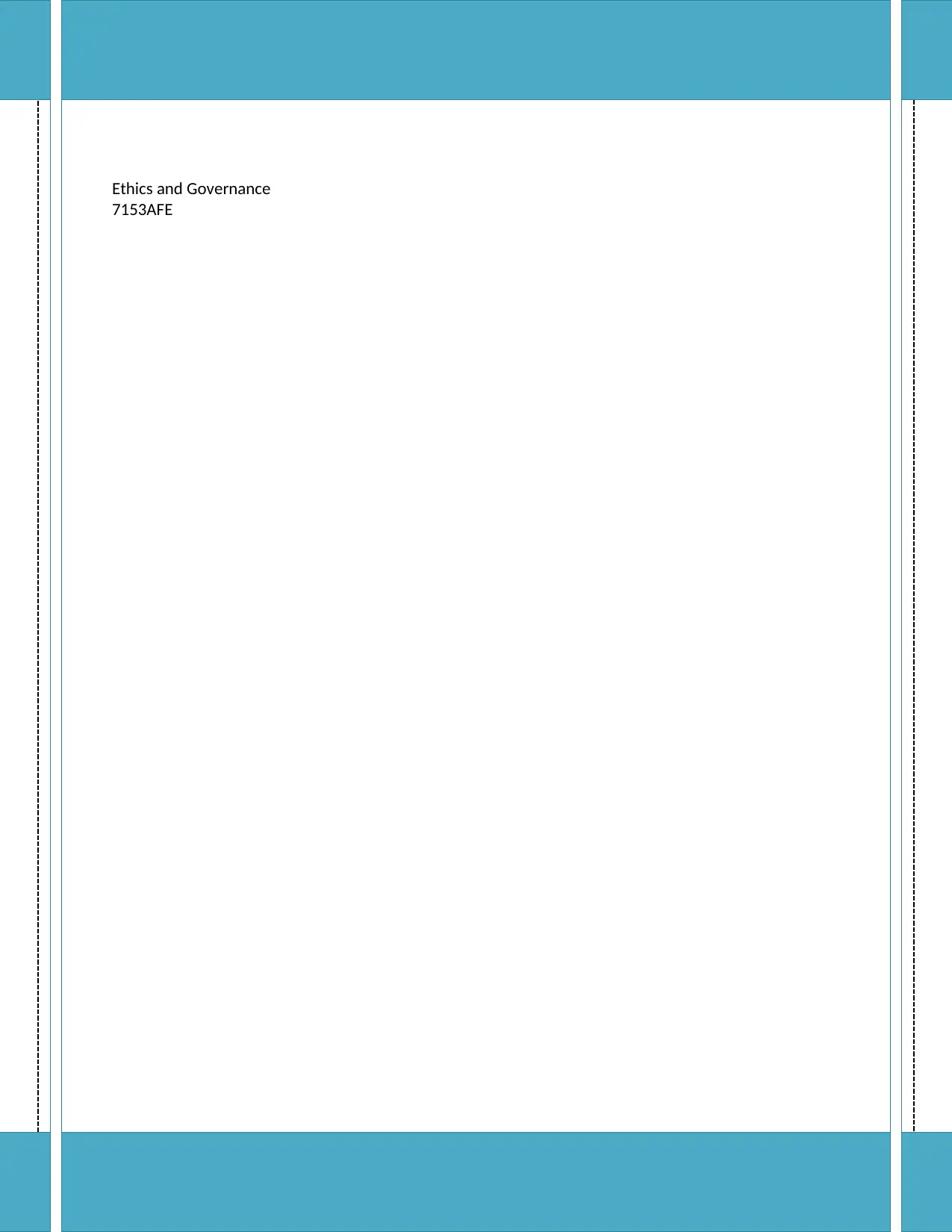
Ethics and Governance
7153AFE
7153AFE
Paraphrase This Document
Need a fresh take? Get an instant paraphrase of this document with our AI Paraphraser
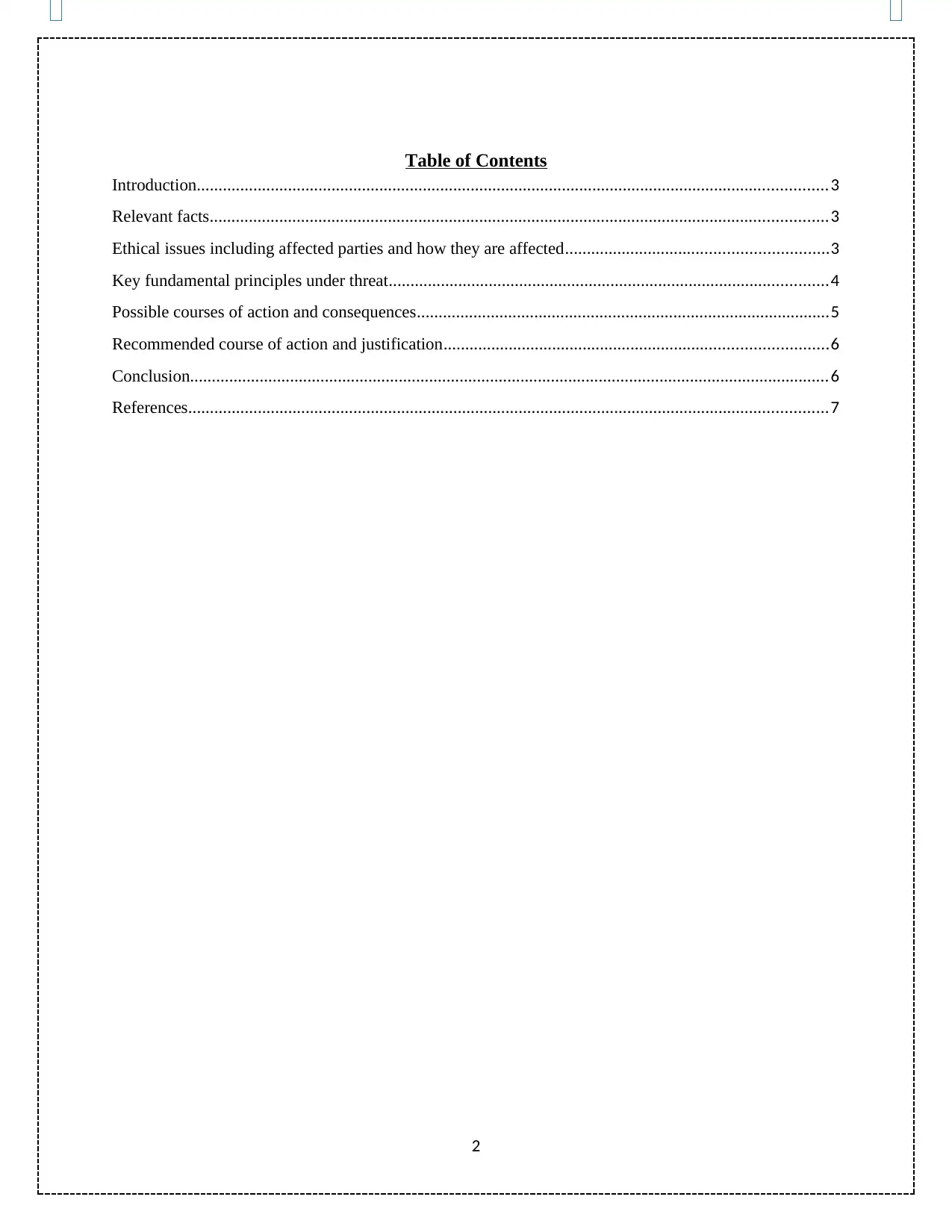
Table of Contents
Introduction.................................................................................................................................................3
Relevant facts..............................................................................................................................................3
Ethical issues including affected parties and how they are affected............................................................3
Key fundamental principles under threat.....................................................................................................4
Possible courses of action and consequences...............................................................................................5
Recommended course of action and justification........................................................................................6
Conclusion...................................................................................................................................................6
References...................................................................................................................................................7
2
Introduction.................................................................................................................................................3
Relevant facts..............................................................................................................................................3
Ethical issues including affected parties and how they are affected............................................................3
Key fundamental principles under threat.....................................................................................................4
Possible courses of action and consequences...............................................................................................5
Recommended course of action and justification........................................................................................6
Conclusion...................................................................................................................................................6
References...................................................................................................................................................7
2
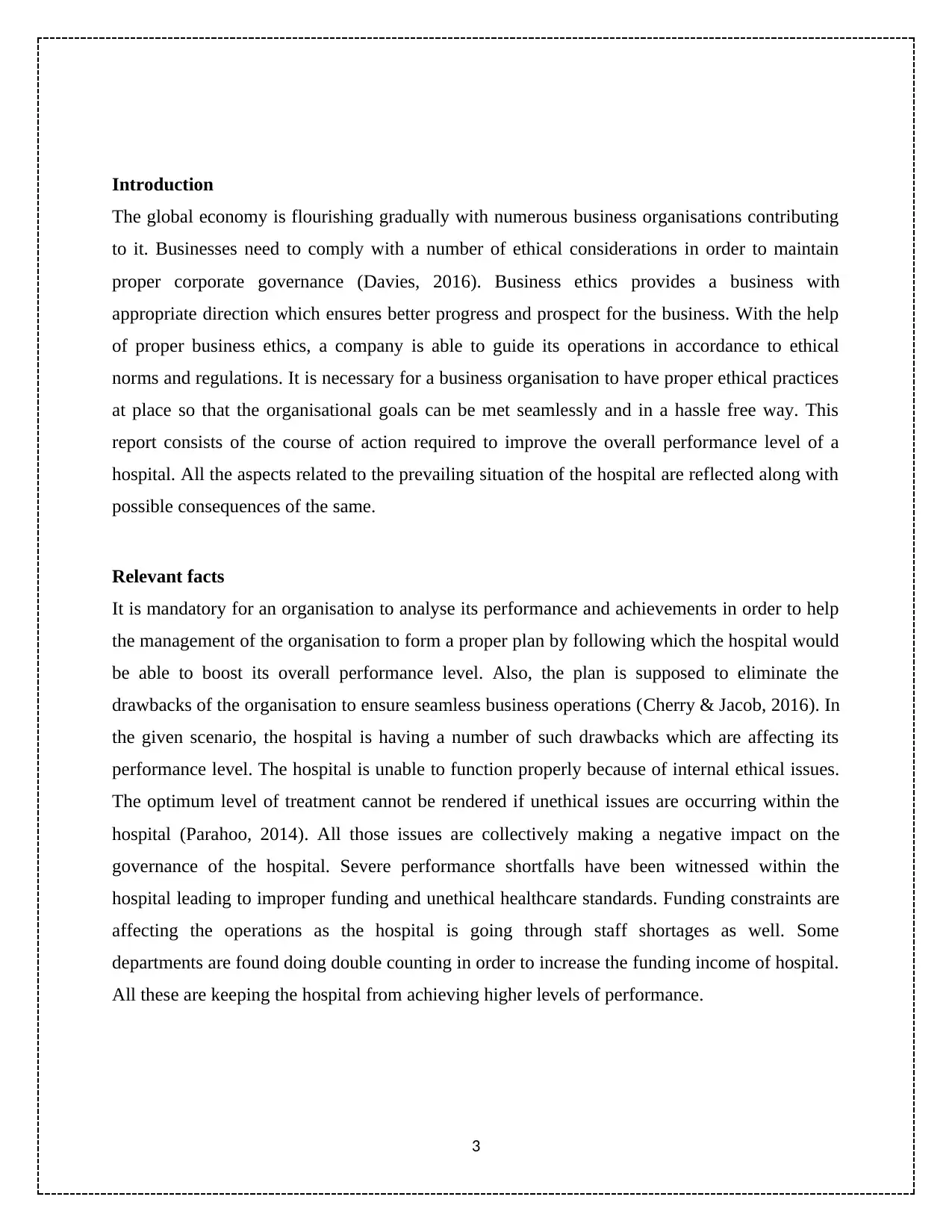
Introduction
The global economy is flourishing gradually with numerous business organisations contributing
to it. Businesses need to comply with a number of ethical considerations in order to maintain
proper corporate governance (Davies, 2016). Business ethics provides a business with
appropriate direction which ensures better progress and prospect for the business. With the help
of proper business ethics, a company is able to guide its operations in accordance to ethical
norms and regulations. It is necessary for a business organisation to have proper ethical practices
at place so that the organisational goals can be met seamlessly and in a hassle free way. This
report consists of the course of action required to improve the overall performance level of a
hospital. All the aspects related to the prevailing situation of the hospital are reflected along with
possible consequences of the same.
Relevant facts
It is mandatory for an organisation to analyse its performance and achievements in order to help
the management of the organisation to form a proper plan by following which the hospital would
be able to boost its overall performance level. Also, the plan is supposed to eliminate the
drawbacks of the organisation to ensure seamless business operations (Cherry & Jacob, 2016). In
the given scenario, the hospital is having a number of such drawbacks which are affecting its
performance level. The hospital is unable to function properly because of internal ethical issues.
The optimum level of treatment cannot be rendered if unethical issues are occurring within the
hospital (Parahoo, 2014). All those issues are collectively making a negative impact on the
governance of the hospital. Severe performance shortfalls have been witnessed within the
hospital leading to improper funding and unethical healthcare standards. Funding constraints are
affecting the operations as the hospital is going through staff shortages as well. Some
departments are found doing double counting in order to increase the funding income of hospital.
All these are keeping the hospital from achieving higher levels of performance.
3
The global economy is flourishing gradually with numerous business organisations contributing
to it. Businesses need to comply with a number of ethical considerations in order to maintain
proper corporate governance (Davies, 2016). Business ethics provides a business with
appropriate direction which ensures better progress and prospect for the business. With the help
of proper business ethics, a company is able to guide its operations in accordance to ethical
norms and regulations. It is necessary for a business organisation to have proper ethical practices
at place so that the organisational goals can be met seamlessly and in a hassle free way. This
report consists of the course of action required to improve the overall performance level of a
hospital. All the aspects related to the prevailing situation of the hospital are reflected along with
possible consequences of the same.
Relevant facts
It is mandatory for an organisation to analyse its performance and achievements in order to help
the management of the organisation to form a proper plan by following which the hospital would
be able to boost its overall performance level. Also, the plan is supposed to eliminate the
drawbacks of the organisation to ensure seamless business operations (Cherry & Jacob, 2016). In
the given scenario, the hospital is having a number of such drawbacks which are affecting its
performance level. The hospital is unable to function properly because of internal ethical issues.
The optimum level of treatment cannot be rendered if unethical issues are occurring within the
hospital (Parahoo, 2014). All those issues are collectively making a negative impact on the
governance of the hospital. Severe performance shortfalls have been witnessed within the
hospital leading to improper funding and unethical healthcare standards. Funding constraints are
affecting the operations as the hospital is going through staff shortages as well. Some
departments are found doing double counting in order to increase the funding income of hospital.
All these are keeping the hospital from achieving higher levels of performance.
3
⊘ This is a preview!⊘
Do you want full access?
Subscribe today to unlock all pages.

Trusted by 1+ million students worldwide
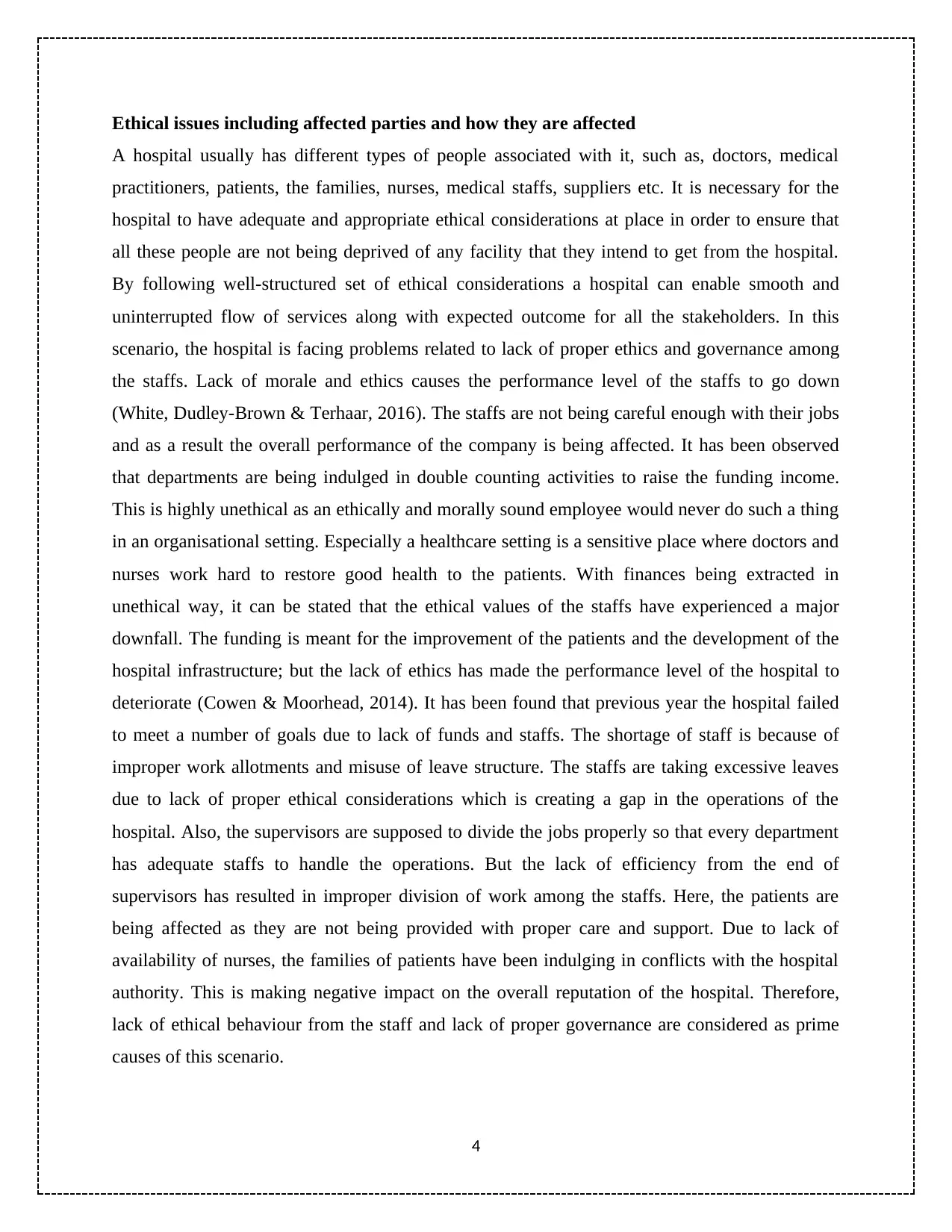
Ethical issues including affected parties and how they are affected
A hospital usually has different types of people associated with it, such as, doctors, medical
practitioners, patients, the families, nurses, medical staffs, suppliers etc. It is necessary for the
hospital to have adequate and appropriate ethical considerations at place in order to ensure that
all these people are not being deprived of any facility that they intend to get from the hospital.
By following well-structured set of ethical considerations a hospital can enable smooth and
uninterrupted flow of services along with expected outcome for all the stakeholders. In this
scenario, the hospital is facing problems related to lack of proper ethics and governance among
the staffs. Lack of morale and ethics causes the performance level of the staffs to go down
(White, Dudley-Brown & Terhaar, 2016). The staffs are not being careful enough with their jobs
and as a result the overall performance of the company is being affected. It has been observed
that departments are being indulged in double counting activities to raise the funding income.
This is highly unethical as an ethically and morally sound employee would never do such a thing
in an organisational setting. Especially a healthcare setting is a sensitive place where doctors and
nurses work hard to restore good health to the patients. With finances being extracted in
unethical way, it can be stated that the ethical values of the staffs have experienced a major
downfall. The funding is meant for the improvement of the patients and the development of the
hospital infrastructure; but the lack of ethics has made the performance level of the hospital to
deteriorate (Cowen & Moorhead, 2014). It has been found that previous year the hospital failed
to meet a number of goals due to lack of funds and staffs. The shortage of staff is because of
improper work allotments and misuse of leave structure. The staffs are taking excessive leaves
due to lack of proper ethical considerations which is creating a gap in the operations of the
hospital. Also, the supervisors are supposed to divide the jobs properly so that every department
has adequate staffs to handle the operations. But the lack of efficiency from the end of
supervisors has resulted in improper division of work among the staffs. Here, the patients are
being affected as they are not being provided with proper care and support. Due to lack of
availability of nurses, the families of patients have been indulging in conflicts with the hospital
authority. This is making negative impact on the overall reputation of the hospital. Therefore,
lack of ethical behaviour from the staff and lack of proper governance are considered as prime
causes of this scenario.
4
A hospital usually has different types of people associated with it, such as, doctors, medical
practitioners, patients, the families, nurses, medical staffs, suppliers etc. It is necessary for the
hospital to have adequate and appropriate ethical considerations at place in order to ensure that
all these people are not being deprived of any facility that they intend to get from the hospital.
By following well-structured set of ethical considerations a hospital can enable smooth and
uninterrupted flow of services along with expected outcome for all the stakeholders. In this
scenario, the hospital is facing problems related to lack of proper ethics and governance among
the staffs. Lack of morale and ethics causes the performance level of the staffs to go down
(White, Dudley-Brown & Terhaar, 2016). The staffs are not being careful enough with their jobs
and as a result the overall performance of the company is being affected. It has been observed
that departments are being indulged in double counting activities to raise the funding income.
This is highly unethical as an ethically and morally sound employee would never do such a thing
in an organisational setting. Especially a healthcare setting is a sensitive place where doctors and
nurses work hard to restore good health to the patients. With finances being extracted in
unethical way, it can be stated that the ethical values of the staffs have experienced a major
downfall. The funding is meant for the improvement of the patients and the development of the
hospital infrastructure; but the lack of ethics has made the performance level of the hospital to
deteriorate (Cowen & Moorhead, 2014). It has been found that previous year the hospital failed
to meet a number of goals due to lack of funds and staffs. The shortage of staff is because of
improper work allotments and misuse of leave structure. The staffs are taking excessive leaves
due to lack of proper ethical considerations which is creating a gap in the operations of the
hospital. Also, the supervisors are supposed to divide the jobs properly so that every department
has adequate staffs to handle the operations. But the lack of efficiency from the end of
supervisors has resulted in improper division of work among the staffs. Here, the patients are
being affected as they are not being provided with proper care and support. Due to lack of
availability of nurses, the families of patients have been indulging in conflicts with the hospital
authority. This is making negative impact on the overall reputation of the hospital. Therefore,
lack of ethical behaviour from the staff and lack of proper governance are considered as prime
causes of this scenario.
4
Paraphrase This Document
Need a fresh take? Get an instant paraphrase of this document with our AI Paraphraser
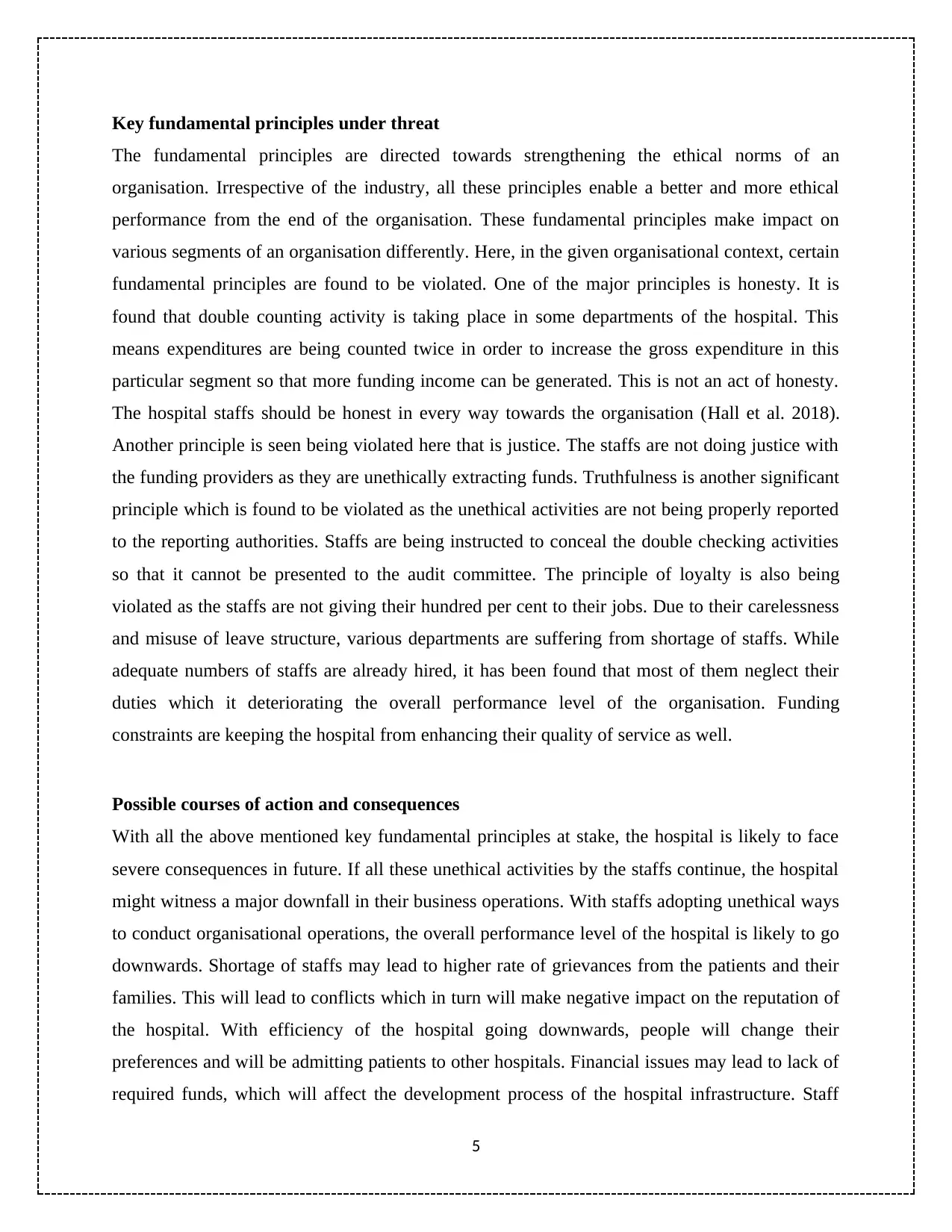
Key fundamental principles under threat
The fundamental principles are directed towards strengthening the ethical norms of an
organisation. Irrespective of the industry, all these principles enable a better and more ethical
performance from the end of the organisation. These fundamental principles make impact on
various segments of an organisation differently. Here, in the given organisational context, certain
fundamental principles are found to be violated. One of the major principles is honesty. It is
found that double counting activity is taking place in some departments of the hospital. This
means expenditures are being counted twice in order to increase the gross expenditure in this
particular segment so that more funding income can be generated. This is not an act of honesty.
The hospital staffs should be honest in every way towards the organisation (Hall et al. 2018).
Another principle is seen being violated here that is justice. The staffs are not doing justice with
the funding providers as they are unethically extracting funds. Truthfulness is another significant
principle which is found to be violated as the unethical activities are not being properly reported
to the reporting authorities. Staffs are being instructed to conceal the double checking activities
so that it cannot be presented to the audit committee. The principle of loyalty is also being
violated as the staffs are not giving their hundred per cent to their jobs. Due to their carelessness
and misuse of leave structure, various departments are suffering from shortage of staffs. While
adequate numbers of staffs are already hired, it has been found that most of them neglect their
duties which it deteriorating the overall performance level of the organisation. Funding
constraints are keeping the hospital from enhancing their quality of service as well.
Possible courses of action and consequences
With all the above mentioned key fundamental principles at stake, the hospital is likely to face
severe consequences in future. If all these unethical activities by the staffs continue, the hospital
might witness a major downfall in their business operations. With staffs adopting unethical ways
to conduct organisational operations, the overall performance level of the hospital is likely to go
downwards. Shortage of staffs may lead to higher rate of grievances from the patients and their
families. This will lead to conflicts which in turn will make negative impact on the reputation of
the hospital. With efficiency of the hospital going downwards, people will change their
preferences and will be admitting patients to other hospitals. Financial issues may lead to lack of
required funds, which will affect the development process of the hospital infrastructure. Staff
5
The fundamental principles are directed towards strengthening the ethical norms of an
organisation. Irrespective of the industry, all these principles enable a better and more ethical
performance from the end of the organisation. These fundamental principles make impact on
various segments of an organisation differently. Here, in the given organisational context, certain
fundamental principles are found to be violated. One of the major principles is honesty. It is
found that double counting activity is taking place in some departments of the hospital. This
means expenditures are being counted twice in order to increase the gross expenditure in this
particular segment so that more funding income can be generated. This is not an act of honesty.
The hospital staffs should be honest in every way towards the organisation (Hall et al. 2018).
Another principle is seen being violated here that is justice. The staffs are not doing justice with
the funding providers as they are unethically extracting funds. Truthfulness is another significant
principle which is found to be violated as the unethical activities are not being properly reported
to the reporting authorities. Staffs are being instructed to conceal the double checking activities
so that it cannot be presented to the audit committee. The principle of loyalty is also being
violated as the staffs are not giving their hundred per cent to their jobs. Due to their carelessness
and misuse of leave structure, various departments are suffering from shortage of staffs. While
adequate numbers of staffs are already hired, it has been found that most of them neglect their
duties which it deteriorating the overall performance level of the organisation. Funding
constraints are keeping the hospital from enhancing their quality of service as well.
Possible courses of action and consequences
With all the above mentioned key fundamental principles at stake, the hospital is likely to face
severe consequences in future. If all these unethical activities by the staffs continue, the hospital
might witness a major downfall in their business operations. With staffs adopting unethical ways
to conduct organisational operations, the overall performance level of the hospital is likely to go
downwards. Shortage of staffs may lead to higher rate of grievances from the patients and their
families. This will lead to conflicts which in turn will make negative impact on the reputation of
the hospital. With efficiency of the hospital going downwards, people will change their
preferences and will be admitting patients to other hospitals. Financial issues may lead to lack of
required funds, which will affect the development process of the hospital infrastructure. Staff
5
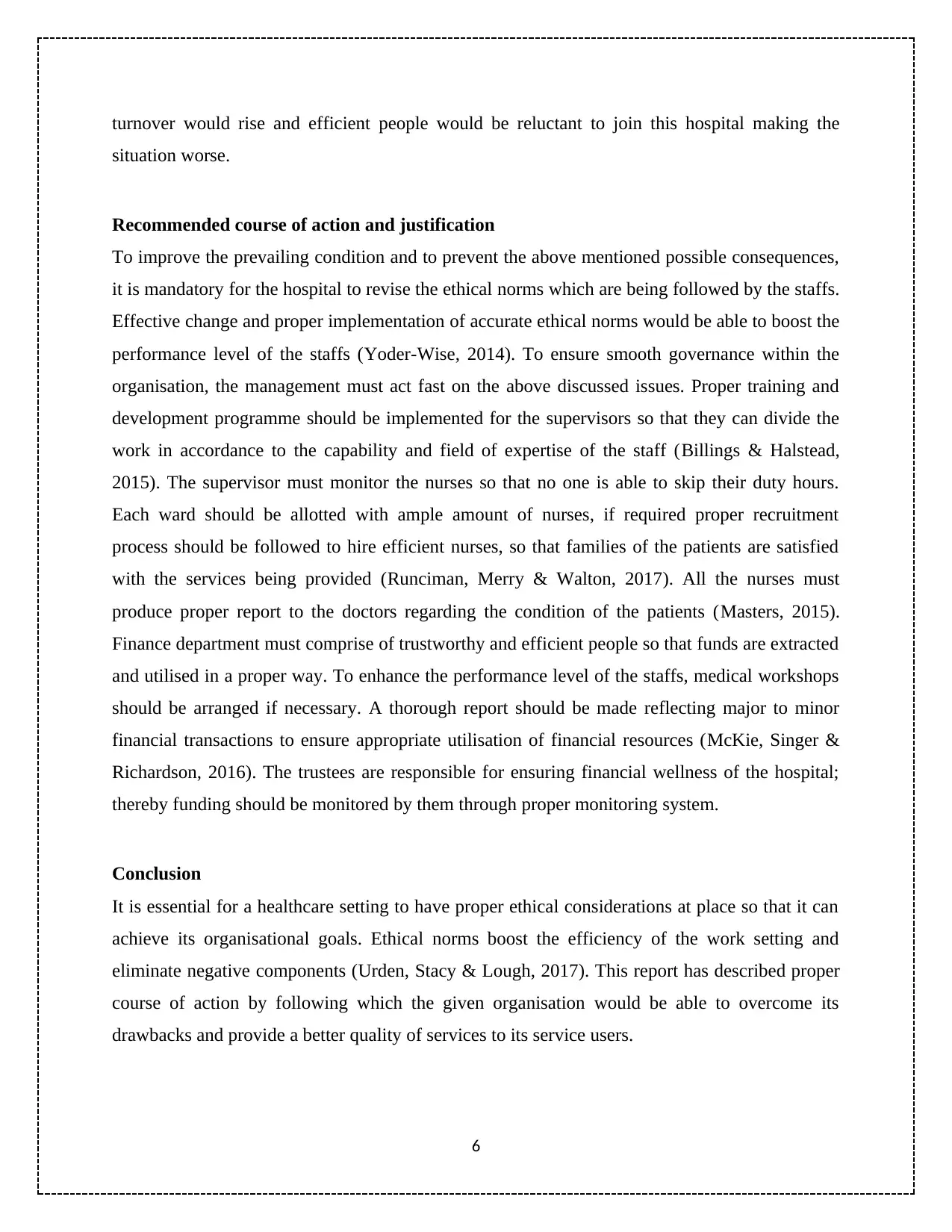
turnover would rise and efficient people would be reluctant to join this hospital making the
situation worse.
Recommended course of action and justification
To improve the prevailing condition and to prevent the above mentioned possible consequences,
it is mandatory for the hospital to revise the ethical norms which are being followed by the staffs.
Effective change and proper implementation of accurate ethical norms would be able to boost the
performance level of the staffs (Yoder-Wise, 2014). To ensure smooth governance within the
organisation, the management must act fast on the above discussed issues. Proper training and
development programme should be implemented for the supervisors so that they can divide the
work in accordance to the capability and field of expertise of the staff (Billings & Halstead,
2015). The supervisor must monitor the nurses so that no one is able to skip their duty hours.
Each ward should be allotted with ample amount of nurses, if required proper recruitment
process should be followed to hire efficient nurses, so that families of the patients are satisfied
with the services being provided (Runciman, Merry & Walton, 2017). All the nurses must
produce proper report to the doctors regarding the condition of the patients (Masters, 2015).
Finance department must comprise of trustworthy and efficient people so that funds are extracted
and utilised in a proper way. To enhance the performance level of the staffs, medical workshops
should be arranged if necessary. A thorough report should be made reflecting major to minor
financial transactions to ensure appropriate utilisation of financial resources (McKie, Singer &
Richardson, 2016). The trustees are responsible for ensuring financial wellness of the hospital;
thereby funding should be monitored by them through proper monitoring system.
Conclusion
It is essential for a healthcare setting to have proper ethical considerations at place so that it can
achieve its organisational goals. Ethical norms boost the efficiency of the work setting and
eliminate negative components (Urden, Stacy & Lough, 2017). This report has described proper
course of action by following which the given organisation would be able to overcome its
drawbacks and provide a better quality of services to its service users.
6
situation worse.
Recommended course of action and justification
To improve the prevailing condition and to prevent the above mentioned possible consequences,
it is mandatory for the hospital to revise the ethical norms which are being followed by the staffs.
Effective change and proper implementation of accurate ethical norms would be able to boost the
performance level of the staffs (Yoder-Wise, 2014). To ensure smooth governance within the
organisation, the management must act fast on the above discussed issues. Proper training and
development programme should be implemented for the supervisors so that they can divide the
work in accordance to the capability and field of expertise of the staff (Billings & Halstead,
2015). The supervisor must monitor the nurses so that no one is able to skip their duty hours.
Each ward should be allotted with ample amount of nurses, if required proper recruitment
process should be followed to hire efficient nurses, so that families of the patients are satisfied
with the services being provided (Runciman, Merry & Walton, 2017). All the nurses must
produce proper report to the doctors regarding the condition of the patients (Masters, 2015).
Finance department must comprise of trustworthy and efficient people so that funds are extracted
and utilised in a proper way. To enhance the performance level of the staffs, medical workshops
should be arranged if necessary. A thorough report should be made reflecting major to minor
financial transactions to ensure appropriate utilisation of financial resources (McKie, Singer &
Richardson, 2016). The trustees are responsible for ensuring financial wellness of the hospital;
thereby funding should be monitored by them through proper monitoring system.
Conclusion
It is essential for a healthcare setting to have proper ethical considerations at place so that it can
achieve its organisational goals. Ethical norms boost the efficiency of the work setting and
eliminate negative components (Urden, Stacy & Lough, 2017). This report has described proper
course of action by following which the given organisation would be able to overcome its
drawbacks and provide a better quality of services to its service users.
6
⊘ This is a preview!⊘
Do you want full access?
Subscribe today to unlock all pages.

Trusted by 1+ million students worldwide
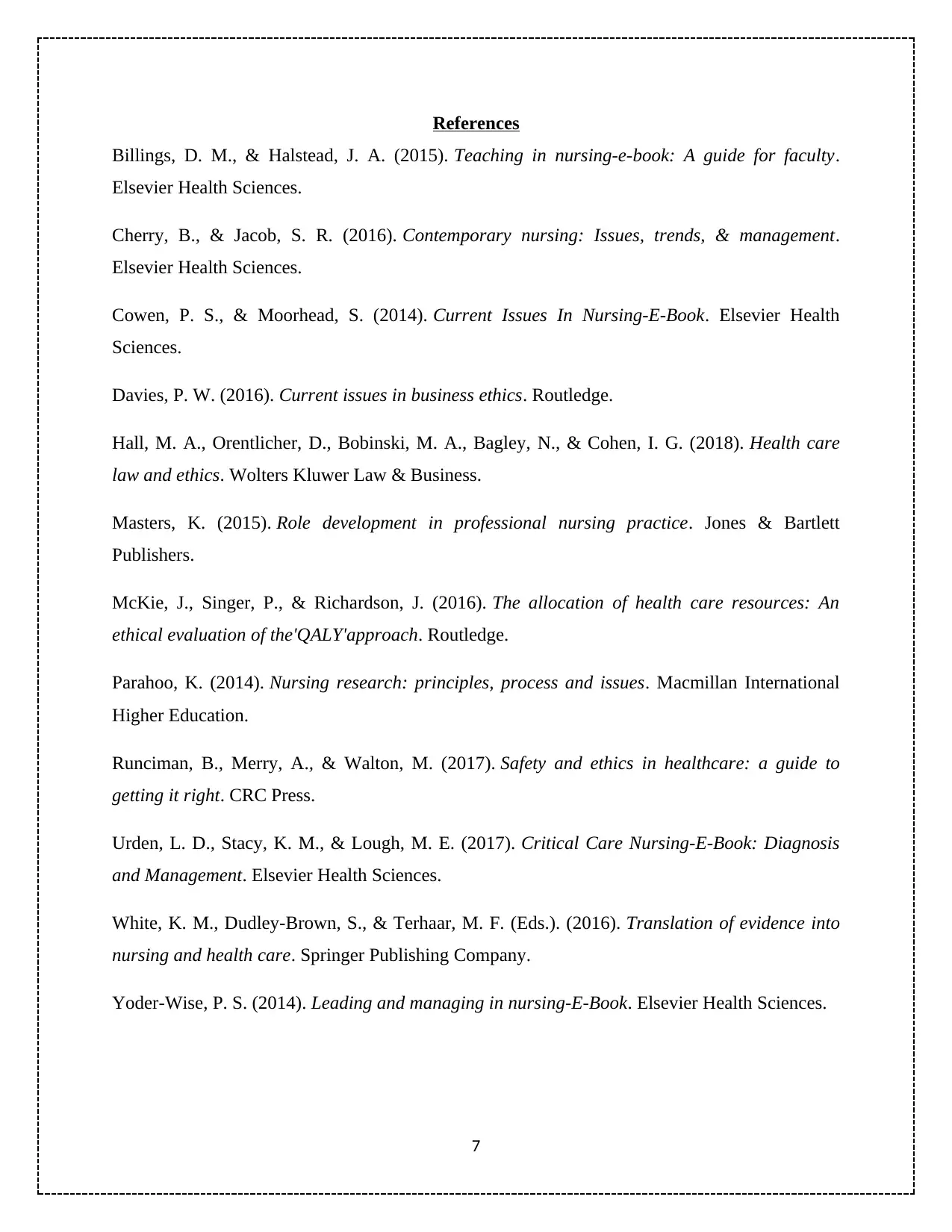
References
Billings, D. M., & Halstead, J. A. (2015). Teaching in nursing-e-book: A guide for faculty.
Elsevier Health Sciences.
Cherry, B., & Jacob, S. R. (2016). Contemporary nursing: Issues, trends, & management.
Elsevier Health Sciences.
Cowen, P. S., & Moorhead, S. (2014). Current Issues In Nursing-E-Book. Elsevier Health
Sciences.
Davies, P. W. (2016). Current issues in business ethics. Routledge.
Hall, M. A., Orentlicher, D., Bobinski, M. A., Bagley, N., & Cohen, I. G. (2018). Health care
law and ethics. Wolters Kluwer Law & Business.
Masters, K. (2015). Role development in professional nursing practice. Jones & Bartlett
Publishers.
McKie, J., Singer, P., & Richardson, J. (2016). The allocation of health care resources: An
ethical evaluation of the'QALY'approach. Routledge.
Parahoo, K. (2014). Nursing research: principles, process and issues. Macmillan International
Higher Education.
Runciman, B., Merry, A., & Walton, M. (2017). Safety and ethics in healthcare: a guide to
getting it right. CRC Press.
Urden, L. D., Stacy, K. M., & Lough, M. E. (2017). Critical Care Nursing-E-Book: Diagnosis
and Management. Elsevier Health Sciences.
White, K. M., Dudley-Brown, S., & Terhaar, M. F. (Eds.). (2016). Translation of evidence into
nursing and health care. Springer Publishing Company.
Yoder-Wise, P. S. (2014). Leading and managing in nursing-E-Book. Elsevier Health Sciences.
7
Billings, D. M., & Halstead, J. A. (2015). Teaching in nursing-e-book: A guide for faculty.
Elsevier Health Sciences.
Cherry, B., & Jacob, S. R. (2016). Contemporary nursing: Issues, trends, & management.
Elsevier Health Sciences.
Cowen, P. S., & Moorhead, S. (2014). Current Issues In Nursing-E-Book. Elsevier Health
Sciences.
Davies, P. W. (2016). Current issues in business ethics. Routledge.
Hall, M. A., Orentlicher, D., Bobinski, M. A., Bagley, N., & Cohen, I. G. (2018). Health care
law and ethics. Wolters Kluwer Law & Business.
Masters, K. (2015). Role development in professional nursing practice. Jones & Bartlett
Publishers.
McKie, J., Singer, P., & Richardson, J. (2016). The allocation of health care resources: An
ethical evaluation of the'QALY'approach. Routledge.
Parahoo, K. (2014). Nursing research: principles, process and issues. Macmillan International
Higher Education.
Runciman, B., Merry, A., & Walton, M. (2017). Safety and ethics in healthcare: a guide to
getting it right. CRC Press.
Urden, L. D., Stacy, K. M., & Lough, M. E. (2017). Critical Care Nursing-E-Book: Diagnosis
and Management. Elsevier Health Sciences.
White, K. M., Dudley-Brown, S., & Terhaar, M. F. (Eds.). (2016). Translation of evidence into
nursing and health care. Springer Publishing Company.
Yoder-Wise, P. S. (2014). Leading and managing in nursing-E-Book. Elsevier Health Sciences.
7
1 out of 7
Related Documents
Your All-in-One AI-Powered Toolkit for Academic Success.
+13062052269
info@desklib.com
Available 24*7 on WhatsApp / Email
![[object Object]](/_next/static/media/star-bottom.7253800d.svg)
Unlock your academic potential
Copyright © 2020–2026 A2Z Services. All Rights Reserved. Developed and managed by ZUCOL.





